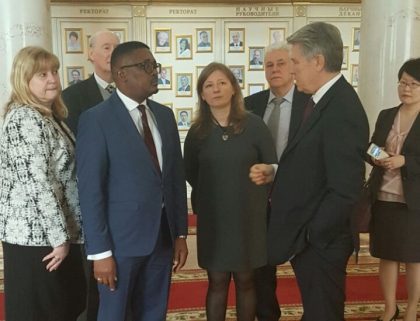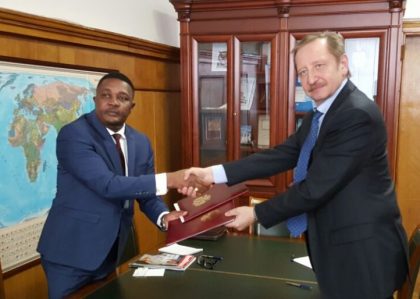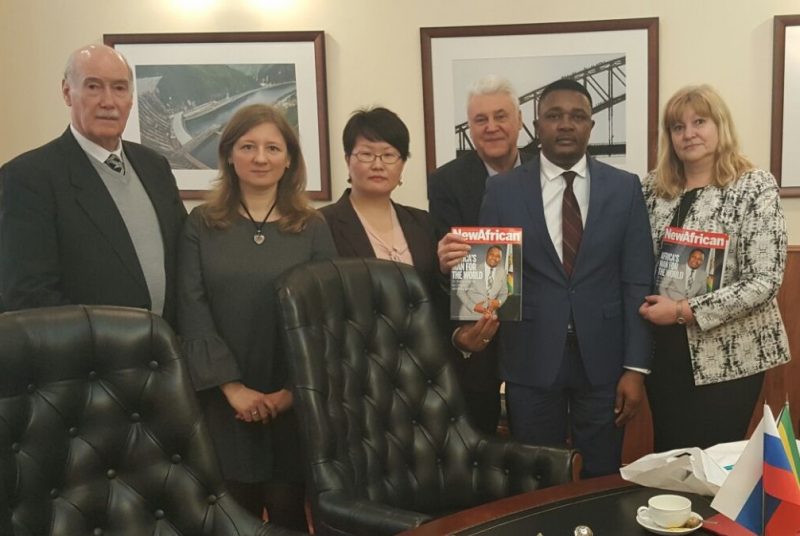In a move designed to boost the 2-way flow of tourists between Russia and Zimbabwe, the 2 countries signed a bilateral Memorandum of Understanding (MOU) in the Russian capital of Moscow this afternoon, bringing to a successful conclusion, long-standing negotiations to link the two countries’ tourism economies.
Zimbabwe’s Minister of Tourism and Hospitality Industry, Dr. Walter Mzembi – fresh from his attendance at the 60th anniversary celebrations of Ghana’s independence in Accra on March 6 and his high-profile participation at the 2017 edition of the International Tourism Bourse (ITB) in Berlin – arrived in Moscow in the early hours of Monday, March 13, and immediately plunged into a hectic round of meetings and engagements with key figures in Russia’s state tourism apparatus.

The highlight of his 2-day visit was the signing of an MOU which provides a detailed framework for the strengthening of tourism ties between the two countries, to be spearheaded on the Zimbabwe side by Dr. Mzembi’s Ministry and the Zimbabwe Tourism Authority (ZTA), and on the Russian side by the Federal Agency for Tourism which falls under the administrative umbrella of the Ministry of Culture of the Russian Federation.
Prior to the signing of the MOU, Dr. Mzembi and the Deputy Director of the Federal Agency for Tourism, Dr. Alexey Alexeevich Konyushkov – representing the head of the agency, along with Dr. Oleg Petrovich Safonov, who had been called to the Office of the Prime Minister – held broad-ranging discussions on the status of bilateral tourism ties between Zimbabwe and Russia and explored various options under the MOU to intensify those ties and increase the flow of tourists between the 2 countries.

The Head of the Federal Agency’s International Department, Dr. Valery Korovkin, who was also present at the meeting, noted that the flow of outbound Russian tourists, including to African destinations, had decreased over the past few years as a consequence of the rapid depreciation of the value of the ruble against the US dollar and other major currencies. He noted, however, that the currency had stabilized and was even regaining strength. The signing of the MOU between Zimbabwe and Russia, therefore, comes at a very propitious moment, and on the basis of the proactive approach towards its implementation, as advocated by Dr. Mzembi and Dr. Konyushkov, will certainly lead to a significant increase in tourism flows between the 2 countries.
“Work is still required with regard to logistics: making it easier for Russian and Zimbabwean travelers to access their preferred tourism destinations in both countries – not only in terms of improving and expanding air linkages between the African continent and the Russian Federation, but also, of course, the issue of facilitating the issuance of entry visas,” commented Dr. Mzembi.

“But, let us take pride in what we have signed today: it marks an important step forward on our journey to bring ourselves closer to one another. Other steps will follow upon this one.”
Dr. Mzembi also took advantage of his meeting with the Russian authorities to make a brief presentation on his bid for election to the post of Secretary General of the United Nations World Tourism Organization (UNWTO).
Although it is not a member of the UNWTO’s Executive Council, and will not, therefore, participate in the forthcoming election of the next Secretary General, the Russian Federation is a member of the organization and, as an important tourism-economy within Europe, naturally takes a keen interest in the activities of the UNWTO and, crucially, its leadership.

“I was both impressed and very pleasantly surprised to discover that the Russian tourism authorities are very well-informed about the forthcoming election and that they have an excellent appreciation of the various candidates and, in that regard, what each one represents in terms of either reforming and renewing the organization – breathing new life into it – or of simply letting it continue to wallow in the still waters it has now come to inhabit,” said Dr. Mzembi.
“I believe I represent and embody the change, reform, and innovation which are required to renew the UNWTO and to make it more relevant for all its member states, and this was the vision I shared with the Russian tourism authorities.”
Earlier in the day, Dr. Mzembi visited the Financial University under the Government of the Russian Federation – an affiliate member of the UNWTO – where he was received by the Rector, Professor Mikhail Eskindarov, and other senior academic staff of the university.

Of primary interest to Dr. Mzembi was the opportunity to learn more about the university’s recently-inaugurated Bachelor Degree program in International and Domestic Tourism, and the possibility of Zimbabwean nationals interested in the tourism field being accommodated, as international students, within that program.
Dr. Mzembi held discussions in this regard with the Director of the University’s Centre for International Cooperation, Dr. Lilia Prikhodko, and with the Deputy First Vice Rector (Educational and Methodical Work), Professor Tatiana Rozanova.
Speaking after the meeting, a visibly up-beat Dr. Mzembi praised the university authorities for their openness and willingness to explore possible areas of cooperation with Zimbabwe in the field of tourism, and expressed the hope that a mechanism could be developed which would enable Zimbabweans interested in the sector to be accommodated within the university’s tourism-related programs so that they could benefit from Russia’s vast experience and expertise.

It was agreed that a formal proposal seeking such a cooperative program would be developed by the Ministry of Tourism and Hospitality Industry for consideration by the university authorities.
Dr. Mzembi was also afforded an opportunity to engage directly with students in the second year of their four-year International and domestic tourism degree course.
Addressing approximately 50 students in one of the faculty’s seminar rooms, Dr. Mzembi briefed them on the current status of global tourism and gave them a succinct overview of his vision for the future development of the sector under the umbrella of the United Nations World Tourism Organization.
Pursuing his thrust and vision on the consummation of a Global Tourism Fund, similar to the Health Fund, Dr. Mzembi challenged academia and the university, going forward to 2030, to steer the UNWTO towards more creative models of resource-mobilization for tourism development – in line with the objectives of the SDGs.
Noting that tourism, with US$1.5 trillion in receipts and ranked third in terms of global export earnings, was too important and too rich a sector to depend on the benevolence and charity of a few, Dr. Mzembi stressed that it is exactly within its lead indicator – arrivals – that the solutions to creative funding are embedded.
“The UNWTO now requires new-generation thinking and a paradigm shift at the top of the global agency to successfully unleash the full potential of the sector,” he said. “It is simply not acceptable that tourism should be presided over by an organization which depends virtually entirely on membership subscriptions to fund its programs.”
“The time for new more creative thinking has dawned. Going forward, and with the right leadership in place, I envisage UNWTO commanding its rightful place within the global system, consolidating and building upon the achievements of the outgoing Secretary General, Dr. Taleb Rifai.
“We will not be anybody’s sympathy-case, nor can we allow small thinking to constrain or limit our vision going forward.”
As he took leave of the student assembly, in unison they wished Dr. Mzembi well in his bid to become the next Secretary General of the UNWTO and repeatedly chanted “Zimbabwe, Russia, victory.”
Dr. Mzembi concludes his 2-day visit to Russia by attending the Moscow International Travel and Tourism Exhibition (MITT) – one of world’s top 5 international tourism fairs – which will run from March 14-16.



Leave a Comment